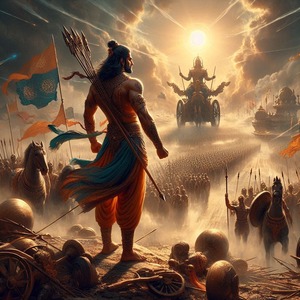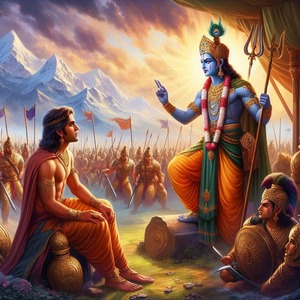Bhagavad Gita, an integral part of the Indian epic Mahabharata, is a timeless scripture that continues to inspire and guide millions around the world. Chapter 1, titled “Arjuna Vishada Yoga,” sets the stage for the profound philosophical discourse that follows. In this chapter, we witness the inner turmoil and moral dilemma of the warrior prince Arjuna as he stands on the battlefield of Kurukshetra, poised to engage in a war against his own kinsmen. The lessons from this chapter are not confined to ancient times; they are profoundly relevant to our modern lives.

The Setting: The Battlefield of Kurukshetra
The Bhagawad Gita begins with the Pandava prince Arjuna preparing to fight in the great war of Kurukshetra. As he surveys the battlefield, he sees his relatives, beloved friends, and revered teachers arrayed against him. Overwhelmed with sorrow and compassion, Arjuna is struck by a profound crisis of conscience. He questions the righteousness of the war and is paralyzed by doubt and fear.
Arjuna’s Dilemma in Bhagawad Gita
In Bhagawad Gita Arjuna’s inner conflict is the central theme of Chapter 1. He is torn between his duty as a warrior (Kshatriya dharma) and his love for his family. He expresses his anguish to his charioteer, Krishna, who will later reveal his divine nature and impart the wisdom of the Gita.
Arjuna’s arguments against the war are multifaceted. He fears the destruction of his kin and the resultant breakdown of family structures, which would lead to societal chaos. He is also troubled by the prospect of incurring sin by killing his relatives and teachers. This moral and emotional turmoil leads Arjuna to lay down his weapons and refuse to fight.
Lessons from Arjuna’s Dejection in Bhagawad Gita
1. The Universality of Moral Dilemmas: Arjuna’s crisis is a universal human experience. In our modern lives, we often face situations where our duties and responsibilities clash with our emotions and values. Whether it’s a challenging decision at work, a personal relationship, or a societal issue, we all encounter moments of profound confusion and doubt.
2. The Importance of Self-Reflection: Arjuna’s hesitation forces him to reflect deeply on his values and principles. In today’s fast-paced world, taking time for introspection is crucial. Reflecting on our actions, motivations, and the broader impact of our decisions can lead to greater clarity and purpose.
3. Seeking Guidance: Arjuna turns to Krishna for guidance. Similarly, seeking advice from trusted mentors, spiritual guides, or counselors can provide us with the perspective and wisdom needed to navigate our dilemmas.
4. Emotional Intelligence: Arjuna’s vulnerability highlights the importance of acknowledging and understanding our emotions. Emotional intelligence involves recognizing our feelings, understanding their impact, and managing them effectively. This self-awareness is essential for making balanced and informed decisions.
Modern Applicability of Arjuna Vishada Yoga in Bhagawad Gita
The themes of Chapter 1 of the Bhagavad Gita are timeless and find relevance in various aspects of modern life. Here are a few examples of how Arjuna’s dejection and subsequent journey towards clarity can be applied today:
1. Workplace Conflicts: In a professional setting, we often face ethical dilemmas and conflicts of interest. Arjuna’s hesitation mirrors the indecision we might feel when our professional duties conflict with personal values. For instance, a manager might struggle with the decision to lay off employees to ensure the company’s survival. Reflecting on Arjuna’s experience can help in finding a balance between duty and compassion.
2. Personal Relationships: Arjuna’s fear of hurting his loved ones resonates with the challenges we face in personal relationships. Whether it’s making a tough decision that might upset a family member or confronting a friend about harmful behavior, the need for courage and clarity is paramount. Arjuna’s story teaches us the importance of open communication and seeking guidance from a higher source or inner wisdom.
3. Societal Responsibilities: As citizens, we encounter moral dilemmas related to social and political issues. For example, participating in movements for social justice may require confronting systemic injustices that affect our communities. Arjuna’s internal battle underscores the need for individuals to stand up for what is right, even when it is difficult.
4. Mental Health: Arjuna’s dejection can be seen as a metaphor for mental health struggles such as anxiety and depression. His vulnerability and the subsequent guidance he receives from Krishna highlight the importance of seeking help and support. In today’s context, this could mean reaching out to mental health professionals or support groups to navigate through challenging times.
5. Spiritual Growth: Arjuna’s journey is ultimately a spiritual one. His initial reluctance and subsequent enlightenment symbolize the spiritual awakening that many individuals seek in their lives. The process of questioning, doubting, and ultimately finding faith and purpose is a common thread in spiritual practices across cultures. Modern spiritual seekers can draw inspiration from Arjuna’s transformation to deepen their own spiritual journeys.
Conclusion
Chapter 1 of the Bhagavad Gita, Arjuna Vishada Yoga, introduces us to the profound inner conflict of Arjuna, setting the stage for the timeless wisdom that Krishna imparts. Arjuna’s dejection and moral dilemma resonate with the challenges we face in our modern lives. The lessons from his experience emphasize the importance of self-reflection, seeking guidance, and understanding our emotions. By applying these teachings to our own dilemmas, we can navigate the complexities of life with greater clarity, purpose, and resilience.
The Bhagavad Gita’s relevance transcends time, offering insights that are as applicable today as they were thousands of years ago. As we confront our own Kurukshetras, may we find inspiration in Arjuna’s journey and the wisdom of Krishna to guide us towards the path of righteousness and self-discovery.
For Content on Sub Conscious Mind: NLP MIND MAP



3 thoughts on “Bhagawad Gita Chapter 1: Arjuna Vishada Yoga- Timeless Lessons for Today’s Challenges”